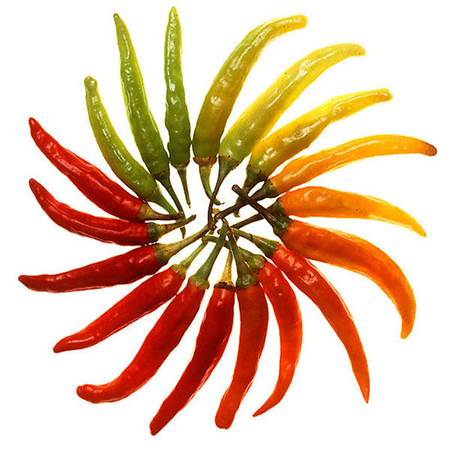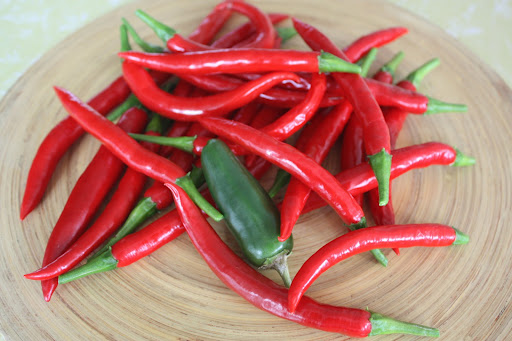Some of us can’t imagine a meal wit a heavy
dose of hot chilli pepper. Scientists say spicy foods have their benefits — and
risks.
Fire fights fire

Chilli
peppers have been used medicinally for centuries.
Chilli peppers have been used medicinally
for centuries. In lab and animal studies, they have shown anti-cancer,
anti-inflammatory, anti-clotting and blood-pressure-lowering properties. And in
small human studies, they have been shown to decrease resting heart rate, lower
insulin levels, alter immune function and have modest beneficial effects on
cholesterol and blood sugar. But this doesn’t mean they will prevent cancer,
diabetes, hypertension or other diseases.
A hot weight-loss aid?
Some research, in animals and humans,
suggests that the capsaicin and capsaicin-related compounds in chili peppers
can speed metabolism, increase fat burning and curb appetite. For example, a
study in the American Journal of Clinical Nutrition in 2009 found slightly
greater abdominal fat loss in overweight people who took large doses of
capsaicin-related substances (in capsules) for 1 2 weeks, compared to those
taking a placebo.
What about the more moderate amounts of
chilli pepper people normally eat? In a 2011 study of young lean people, in
Physiology and Behaviour, consuming chilli pepper in a meal led to reduced food
intake and less hunger for fatty and salty foods - though only in people who
didn’t normally eat spicy foods. That is, any benefit of spicy foods may
subside with regular consumption. And the effects may never be great enough to
lead to significant weight loss.
A gut reaction

If
you like spicy foods and they like you, go ahead and turn up the heat.
Not surprisingly, spicy foods can aggravate
some gastrointestinal problems. In particular, capsaicin can increase abdominal
pain and burning in people with indigestion or irritable bowel syndrome (lBS),
according to a 2010 review in the Journal of Neurogastroenterology and
Motility.
Studies have not consistently found that
spicy foods worsen heartburn in people with gastroesophageal reflux disease
(GERD), however. Many people with OERD blame their heartburn on spicy foods
—though there’s no evidence that abstaining from them reduces symptoms,
according to a 2008 review in the Archives of Internal Medicine.
Interestingly, regular consumption of
capsaicin containing foods has been linked with reduced GERD and indigestion.
And in countries such as China and Thailand, where people eat lot of hot foods,
there is actually a lower prevalence of GERD than in countries where people
consume such foods less often. Of course, other factors besides the spiciness
of foods may also be involved.
Studies are mixed about whether spicy foods
increase the risk of esophageal cancer. Though some studies in India and China
have found an association, a 2010 paper in Cancer Causes and Control, for
instance, did not. Chili peppers have been blamed for causing ulcers, but
there’s no evidence that even the hottest ones are harmful. In fact, some research
suggests that capsaicin may protect against ulcers.
Bottom line:
If you like spicy foods and they like you, go ahead and turn up the heat. But
if you have a gastrointestinal condition, evaluate your diet to see if spicy
foods might be precipitating or exacerbating your symptoms. If they are a
factor, you don’t necessarily have to eliminate all spicy foods, but you may
want to at least tone it down. As for weight-loss claims, any effect of chili
or capsaicin on appetite and calorie burning, even with large supplemental
doses, is likely to be minimal at best and not long-lasting.